人教版英语八年级下unit 9
人教版新目标英语八年级下册:Unit 9《Have you ever been to museum》 讲解+练习题目+答案
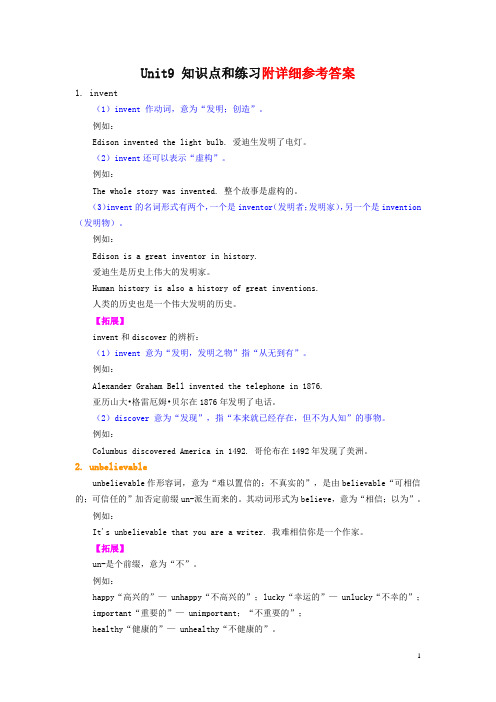
Unit9 知识点和练习附详细参考答案1. invent(1)invent 作动词,意为“发明;创造”。
例如:Edison invented the light bulb. 爱迪生发明了电灯。
(2)invent还可以表示“虚构”。
例如:The whole story was invented. 整个故事是虚构的。
(3)invent的名词形式有两个,一个是inventor(发明者;发明家),另一个是invention (发明物)。
例如:Edison is a great inventor in history.爱迪生是历史上伟大的发明家。
Human history is also a history of great inventions.人类的历史也是一个伟大发明的历史。
【拓展】invent和discover的辨析:(1)invent 意为“发明,发明之物”指“从无到有”。
例如:Alexander Graham Bell invented the telephone in 1876.亚历山大•格雷厄姆•贝尔在1876年发明了电话。
(2)discover 意为“发现”,指“本来就已经存在,但不为人知”的事物。
例如:Columbus discovered America in 1492. 哥伦布在1492年发现了美洲。
2. unbelievableunbelievable作形容词,意为“难以置信的;不真实的”,是由believable“可相信的;可信任的”加否定前缀un-派生而来的。
其动词形式为believe,意为“相信;以为”。
例如:It's unbelievable that you are a writer. 我难相信你是一个作家。
【拓展】un-是个前缀,意为“不”。
例如:happy“高兴的”— unhappy“不高兴的”;lucky“幸运的”— unlucky“不幸的”;important“重要的”— unimportant;“不重要的”;healthy“健康的”— unhealthy“不健康的”。
人教版八年级下册英语Unit 9单元语法知识点总结

人教版八年级下册英语Unit 9单元语法知识点总结本单元重点短语的具体用法1. at night:在夜晚。
例如:I usually go to bed at night.(我通常在夜晚睡觉。
)2. in a more natural environment:在一个更加自然的环境中。
例如:We can enjoy the beauty of nature in a more natural environment.(我们可以在一个更加自然的环境中欣赏大自然的美丽。
)3. all year round:一年到头;终年。
例如:The flowers bloom all year round in this garden.(这个花园里的花一年到头都开放。
)4. be far from:离……远。
例如:The school is far from my home.(学校离我家很远。
)5. in the dark:在黑暗中。
例如:I can't see anything in the dark.(我在黑暗中什么也看不见。
)6. in the past:在过去。
例如:Life was very different in the past.(过去的生活非常不同。
)7. have been to sp.:去过某地。
例如:I have been to Beijing many times.(我去过北京很多次。
)8. science museum:科学博物馆。
例如:We visited the science museum last weekend.(我们上周末参观了科学博物馆。
)9. history museum:历史博物馆。
例如:The history museum has many interesting exhibits.(历史博物馆有很多有趣的展品。
)10. amusement park:游乐园。
例如:We had a great time at the amusement park.(我们在游乐园玩得很开心。
人教版八年级下册 英语 Unit 9(43个单词)

n. 娱乐;游戏
英文
人教版八年级下册 Unit 9(43个单词)
游乐场
adv. 在某处;到某处
n. 照相机;摄影机;摄像机
n. 发明;发明物
v. 发明;创造
adj. 难以置信的dj. 迅速的;快速的
adj. 特别的;不寻常的
n. 坐便器;厕所
v. 鼓励
adj. 社会的
一方面 另一方面
adj. 和平的;安宁的
n.表演;演出
adj. 完美的;完全的
茶具
pron. (it的反身代词)它自己
v.收集;采集
两个;一对;几个
adj. 德国的;德语的;德国人的 n. 德国人;德语 n. 主题 n. 供骑乘的游乐设施;短途旅程 n. 省份 num.一千 adj. 安全的;无危险的 adv. 仅仅;只;不过 v.&n. 害怕;惧怕 conj.不管…(还是);或者…(或者);是否 n. 印度人 adj. 印度的 n. 日本人;日语 adj. 日本的;日本人的;日语的 n. 狐狸 全年 n. 赤道 conj. 在任何…的时候;无论何时 n. 春天 adv. 主要地;通常 n. 地点;位置 唐老鸭 n. 新加坡 n. 东南亚
新课标人教版八年级英语下册Unit 9 Have you ever been to an amuse

—So did Tina.
中国地图
蒂娜也去了。
—He has been a soldier for two years.
要点点拨
他已经当了两年兵了。
go inline skating 滑旱冰
—So have I.
我也是。
全析提示
3.Look at the map of the town.Listen and circle the places 助动词 have 和 has 可以与前面的
you hear.
主语缩略’ve 和’s。
看城镇的地图。听录音并圈出你听到的地方。
如:we’ve,they’ve,he’s,
water world 水上世界
it’s 等。
city library 城市图书馆
have not 常缩略为 haven’t,has
fun times amusement park
如果说“欢迎回家”该怎么说呢?
把 1a 中你的回答和你搭档的回答对照一下。
Wele back home!
4.For me,“I have to!” is number two.
对我来说“I have to!”是第二位的。
要点点拨
5.Listen to a teacher interview a student.Circle the newsletter 业务通讯;新闻信札
route“路线、小路、小巷”,使
The main attraction was a Charlie Chaplin film.
用 X 围也较小。course 表示船的
吸引人的主要是查理·卓别林的电影。
“航道”或飞机的“航线”。
The idea of being a teacher has little attraction to young
人教版八年级下册初二英语unit9第九单元词形转换及默写
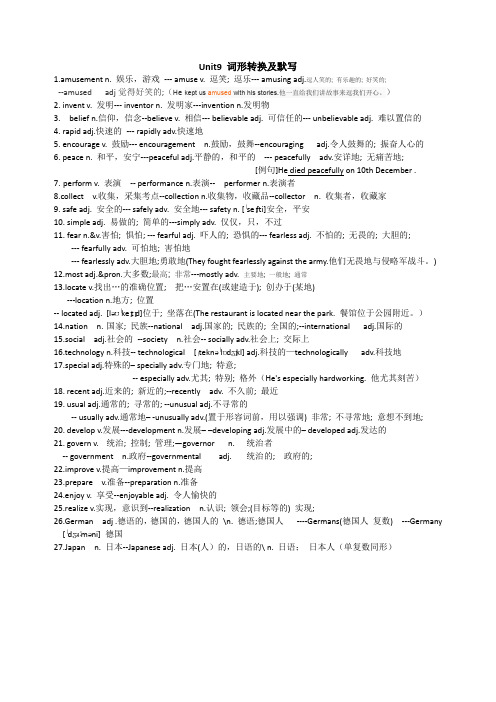
Unit9 词形转换及默写1.amusement n. 娱乐,游戏--- amuse v. 逗笑; 逗乐--- amusing adj.逗人笑的; 有乐趣的; 好笑的;--amused adj觉得好笑的;(He kept us amused with his stories.他一直给我们讲故事来逗我们开心。
)2. invent v. 发明--- inventor n. 发明家---invention n.发明物3. belief n.信仰,信念--believe v. 相信--- believable adj. 可信任的--- unbelievable adj. 难以置信的4. rapid adj.快速的--- rapidly adv.快速地5. encourage v. 鼓励--- encouragement n.鼓励,鼓舞--encouraging adj.令人鼓舞的; 振奋人心的6. peace n. 和平,安宁---peaceful adj.平静的,和平的--- peacefully adv.安详地; 无痛苦地;[例句]He died peacefully on 10th December .7.perform v. 表演-- performance n.表演--performer n.表演者8.collect v.收集,采集考点--collection n.收集物,收藏品--collector n. 收集者,收藏家9. safe adj. 安全的--- safely adv. 安全地--- safety n. [ˈseɪfti]安全,平安10. simple adj. 易做的; 简单的---simply adv. 仅仅,只,不过11. fear n.&v.害怕; 惧怕; --- fearful adj. 吓人的; 恐惧的--- fearless adj. 不怕的; 无畏的; 大胆的;--- fearfully adv. 可怕地; 害怕地--- fearlessly adv.大胆地;勇敢地(They fought fearlessly against the army.他们无畏地与侵略军战斗。
新课标人教版八年级英语下册Unit 9 Have You Ever Been to an Amuse

Unit 9 Have You Ever Been to an Amusement Park?一、学习目标:1.掌握现在完成时的用法;2.了解一般过去时、现在完成时和现在完成进行时的意义的区别;3.能够准确使用多种时态谈论自己的经历。
二、学习重点难点:1. 现在完成时由主语+have/has+过去分词构成。
其主要用法如下:I.在未指明具体时间的情况下,现在完成时动词通常可以表示在说话之前已经完成,而后果或影响至今仍存在的动作。
例如:The concert has started. 音乐会已经开始。
I have had breakfast. 我已吃过早饭。
注意:have gone to 和have been to 在意义上有区别。
例如:He has gone to Hong Kong. 他到某某去了。
(他已前往某某,或在途中,或已到达。
说话人暗示他现在不在现场。
)He has been to Hong Kong. 他曾到过某某。
(说话人认为他过去到过某某,现在已不在该地。
言外之意他对某某有所了解。
)II. 现在完成时动词可以表示开始于过去持续到现在(也许还会继续进行下去)的动作或状态。
例如:1) I have studied English since last year. 我从去年开始学习英语。
2) She has lived in Beijing for five years. 她住在已经五年了。
注意:e, go , leave, arrive, buy, lose, receive, join, die, bury 和marry 等动词所表示的动作是一时的,不能延续的,故不能与for …,since …等开头的表示一段时间的状语连用。
不过,这些词用于否定句则可以与表示持续的时间状语连用,即动作的不发生是可以持续的。
例如:不能说:*He has e to Beijing for two years.*He has bought that book for three weeks.*He has joined the Army for one and a half years.*His grandma has died for nine months.* I have received his letter for a month.可以说:He has been in Beijing for two years.He has had that book for three weeks.He has been in the army for one and a half years.His grandma has been dead for nine months.I haven't received his letter for almost a month.或者:It is two years since he came to Beijing.It is three weeks since he bought that book.It is one and a half years since he joined the Army.It is nine months since his grandma died.2. 现在完成时把过去的动作和现在的结果联系起来,一般过去时只限于表示过去的动作本身,与现在的结果无关。
Unit9单元讲义人教版八年级英语下册

Unit9 Have you ever been to a museum?单词短语及重点句型一、单词讲解1 somewhere adv.在某处;到某处somewhere 不定副词,意为“某地”。
go somewhere different 意为“去与众不同的某地,去某个独特的地方”。
I want to go somewhere different and live alone. 我想去一个与众不同的地方独自生活。
拓展:由some, any, no, every分别加上where构成的副词叫不定副词。
即:somewhere 某个地方, anywhere 任何地方, nowhere 无处,哪里都不, everywhere 每个地方。
2 invent v.发明;创造1)invent 作动词,意为“发明;创造”。
Edison invented the light bulb. 爱迪生发明了电灯。
2)invent还可以表示“虚构”。
The whole story was invented. 整个故事是虚构的。
3)invent的名词形式有两个,一个是inventor(发明者;发明家),另一个是invention(发明物)。
Edison is a great inventor in history. 爱迪生是历史上伟大的发明家。
辨析:invent和discover的辨析:①invent 意为“发明,发明之物”指“从无到有”。
Alexander Graham Bell invented the telephone in 1876. 亚历山大•格雷厄姆•贝尔在1876年发明了。
②discover 意为“发现”,指“本来就已经存在,但不为人知”的事物。
Columbus discovered America in 1492. 哥伦布在1492年发现了美洲。
3 unbelievable adj.难以置信的;不真实的unbelievable作形容词,意为“难以置信的;不真实的”,是由believable“可相信的;可信任的”加否定前缀un派生而来的。
人教版八年级英语下 Unit 9 Can you come to my party_ Sectio
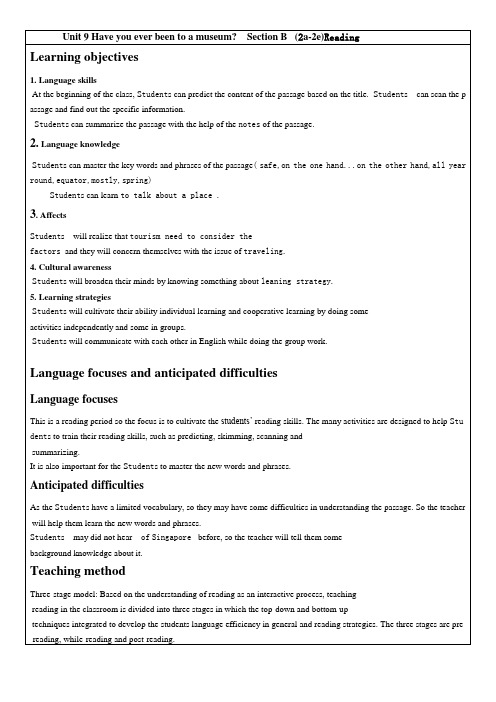
activities independently and some in groups.
Students will communicate with each other in English while doing the group work.
Language focuses and anticipated difficulties
Studentsmay did not hearofSingaporebefore, so the teacher will tell them some
background knowledge about it.
Teaching method
Three-stage model: Based on the understanding of reading as an interactive process, teaching
Teaching aidsMultimedia devices and PPT documents: In order to help Students to fully
understand the whole passage, I adopt Multimedia devices and PPT documents to bring the
[Aims]
人教版八年级下册英语 Unit9 知识清单含练习

Unit9 Have you ever been to a museum?I、词性转换1.amusement. n.娱乐,游戏→amusing. adj.娱乐的2.invent. v.发明→invention. n.发明→inventor. n.发明家,发明者3.believe. v相信,认为可能→→unbelievable. adj不可思议的,不敢相信的→unbelievably. adv不可思议地4.rapid. adj.快速的→rapidly. adv.快速地,迅速地5.usual. adj.通常的,寻常的→usually. adv.寻常地,通常地→unusual. adj.不寻常的,异样的,有异常的6.encourage. v.鼓励→encouraging. adj.鼓励的,鼓舞的,刺激的→courage. n.勇气7.social. adj.社会的,社交的→society. n.社会8.peace. n和平,宁静→peaceful. adj和平的,宁静的→peacefully. adv和平地,宁静地9.performer. n表演者,演员→perform. v表演→performance. n表演10.collect. v.收集→collection. n.收集11.safe. adj.安全的,无危险的→safety. n.安全12.simply. adv.仅仅,不过→simple. adj.简单的13.India. n.印度→Indian. adj.印度人,印度的,印度语的14.Japan. n.日本→Japanese. adj.日本的,日本人的,日语的15.most. adj.大多数,大部分的→mostly. adv.大部分地,主要地16.locate. v. 定位,坐落于→location. n.位置,坐落17.nation. n.国家→national. adj.国家的,名族的→nationality. n.名族,国籍international. adj. 国际的II、短语搭配1.at night 在晚上2.all year round 一年到头,终年3.be far from 离......远4.in the dark 在黑暗中5.in the past 在过去6.learn about sth 了解有关.....的情况7.on the weekend 在周末8.put up 搭建,张贴9.in such a rapid way 以如此速猛的方式10.different kinds of 各种各样的11.thousands of 数以千计的12.three quarters 四分之三13.have problems /trouble / difficulty (in ) doing sth 做某事有困难14.during the daytime 在白天15.a couple of times 好几次16.right now 现在,目前17.walk around 到处走18.hear of 听说19.take a ride 兜风20.encourage sb. to do sth 鼓励某人做某事21.on the one hand....on the other hand 一方面,另一方面III、语法总结⑴ have been to _________________________⑴have gone to_________________________⑴ have been in_________________________分数的表达1).结构: a).分子用基数词,分母用序数词.分子(基数词) 1分母(序数词) 4 =one fourth = one quarterb).当分子大于1时,分母为序数词加s.¾ = three fourths = three quarters2).注意:分数词的几种特殊形式.1/3—one third = a third 1/4—one fourth = a quarter1/2—one second = a half 3/4—three fourths = three quarters3).分数词作主语时, 谓语动词根据分数词后面的名词来确定.不可数名词+动词单三形式分数+ of +可数名词+ 动词变复数形式1.I want to go to the t . Where is the bathroom?2.I do some sports after school. M basketball, sometimes football.3.i don’t like traveling by air because I have a f of flying.4.Now people hardly buy c anymore because phones can take photos,too.5.It’s not s to swim alone in the river.6.I first started to c stamps at the age of 4.7.I lost one of my earrings. But I’m sure it’s s in this house.8.S is the season when all kinds of flowers start to come out.9.It’s very quiet and p here in the woods. We can only hear the birds singing and flying.10.We are going to the theatre. And the evening’s p will begin at 8:00pm.11.I want to thank everyone who has e me and supported(支持) me.12.Alexander Graham Bell i the telephone in 1876.13.Everywhere the superstar goes, he gets t of fans waiting for him in the airport.14.David is always the first to come to school. It’s u for him to be late.15.Henan P has the largest population in China.16.I think the dishwasher(洗碗机) is a wonderful i to help people live an easier life.17.The teacher is very happy because her students have made great p in English recently.18.W she wins or loses, this is her last chance.19.We face a lot of s problems today such as low pay and high house price.20.This afternoon, three G visited our school.\1.I have never been Hongkong before.2.Sam has gone Yunnan. He will be back in a week.3.David lives in Hangzhou now. He’s been Hangzhou since 2011.4.------This is Jack. May I speak to Linda?------Sorry, Jack. Linda (go) to the cinema.5.------How long has Mr. Green lived in China?------ four years.6.You helped me a lot. You can eat food for free in my restaurant (when) you like.7.She asks we will go shopping on Saturday morning or not.8.I like traveling and I want to work a tour guide.9.Lily’s father has a large (collect) of tea sets.10.The book (it) is so helpful that everyone likes it.11.The bad news goes (rapid) from mouth to mouth.12.It’s easy to save the tree, you (simple) have to cut off the dead parts.13.------I have never tried warm spring before.------ have I. Let’s book two tickets and try tomorrow.14.Watching the tea (prepare) is just as enjoyable as drinking the tea itself.15.Singapore is a good place (practice) your English.16.I have visited several places of interest summer vacation.17.My teacher often encourages me (read) more English magazines.18.About two (three) of the workers are women. The rest are men.19.Kunming is 1,800 kilometers far Nanjing.20.London Zoo is the (interesting) zoo I have ever visited.Jane is a warm-hearted girl. She is only ten years old, but she has big ideas of helping other kids.Jane took part in a winter camp 1. __________ the age of eight. During her stay in the camp, she went to visit some kids in poor areas. She felt sad that the kids there didn't have new clothes to wear and 2. __________ (toy) to play with. After she returned home, she kept thinking about 3. __________ to do to help those kids.One morning, Jane saw some elder kids 4. __________ (sell)lemon juice by the street. They wanted to raise money to help their friends. Then she came up with 5. __________ idea.6.__________ the help of her mother, Jane set up her first lemonade stand(摊位). In a week, it made $52.7.__________ it was only a little money, she helped 12 kids with it! She felt very excited when she saw smiles on 8. __________ (they) faces.After that, her mother helped her start a program called Jane's Lemonade for Love. Up to now, she has already raised 9. __________ (many) than $17,000! She is going to spend the money on clothes, toys and books 10.__________ the poor kids.Robert Lee grew up in New York. Because his family wasn’t ___16___, he learned from a young age that it’s important to cut down on food waste. ____17____ he was at school, he joined a student group to deliver leftover to people ____18____ homes. This experience made him ____19____ how serious the problem of food waste was.After ____20____ school, Lee and a friend started a club called Rescuing Leftover Cuisine. Its ___21___ is to get unsold food from restaurants and deliver it to people who need food. The members take the leftover food from restaurants around the city and ____22____ it to those in need.Lee and his team make an APP ____23____ for the club. Restaurants use it to give them the ____24____ about how much leftover food they have each day. Then members get the food and give it out. Lee’s club is a(n)____25____ now. He and his team have delivered over 150,000 kilos of food, ____26____ almost 300,000 meals to people who need them.Lee just does a(n) ____27____ thing but he has really improved the ____28____ of people around us. But Lee says that ___29___ work isn’t over. “It is ___30___ the beginning. The need is so great that we need to do a lot more.”16.A.big B.small C.poor D.rich17.A.Though B.While C.Until D.After18.A.at B.by C.without D.over19.A.decide B.agree C.understand D.remember20.A.passing B.visiting C.checking D.leaving21.A.decision B.purpose C.address D.standard22.A.give B.lend C.add D.save23.A.safely B.widely C.especially D.quietly24.A.advice B.reason C.answer D.information25.A.dream B.success C.comfort D.event26.A.serving B.cooking C.selling D.buying27.A.easy B.sad C.little D.bad28.A.lives B.plan C.safety D.health29.A.my B.their C.our D.your30.A.even B.also C.just D.again。
人教版 八年级英语 下册 Unit_9_Have_you_ever_been_to_a_museum

dish.
Tapescripts:
Boy 1: So, Peter, how long have you been in China? Peter: I’ve been here for two weeks, but I’m going back to Australia tomorrow. Boy 1: Have you traveled much? Peter: Yes, I have. I’ve seen many interesting things. Boy 1: Have you visited the Palace Museum? Peter: Yes, I have. I went there last week. It was wonderful. There were so many beautiful treasures. Boy 1: And have you been to the Great Wall?
1st listening
1b
Listen to a student interviewing a foreign student. Check (√) the questions you hear.
___√_ Have you visited the Palace Museum?
___√_ Have you been to the Great Wall?
人教版八年级英语下册Unit9 Have you ever been to a museum知识点梳理及单元复习
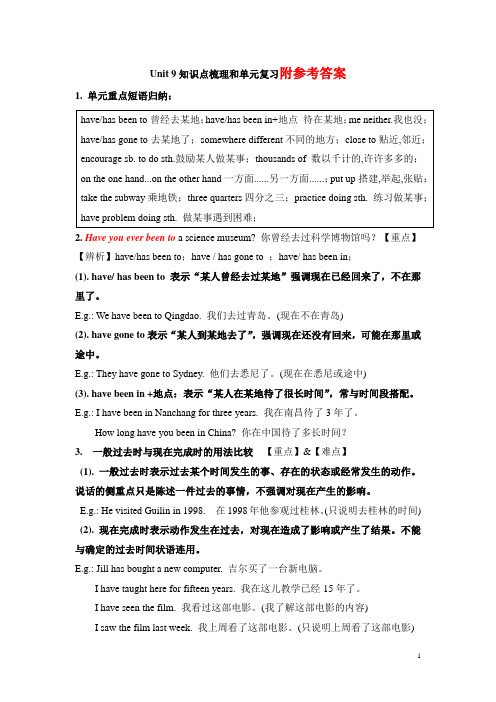
Unit 9知识点梳理和单元复习附参考答案1. 单元重点短语归纳:have/has been to曾经去某地;have/has been in+地点待在某地;me neither.我也没;have/has gone to去某地了;somewhere different不同的地方;close to贴近,邻近;encourage sb. to do sth.鼓励某人做某事;thousands of 数以千计的,许许多多的;on the one hand...on the other hand一方面......另一方面......;put up搭建,举起,张贴;take the subway乘地铁;three quarters四分之三;practice doing sth. 练习做某事;have problem doing sth. 做某事遇到困难;2. Have you ever been to a science museum? 你曾经去过科学博物馆吗?【重点】【辨析】have/has been to;have / has gone to ;have/ has been in;(1). have/ has been to 表示“某人曾经去过某地”强调现在已经回来了,不在那里了。
E.g.: We have been to Qingdao. 我们去过青岛。
(现在不在青岛)(2). have gone to表示“某人到某地去了”,强调现在还没有回来,可能在那里或途中。
E.g.: They have gone to Sydney. 他们去悉尼了。
(现在在悉尼或途中)(3). have been in +地点:表示“某人在某地待了很长时间”,常与时间段搭配。
E.g.: I have been in Nanchang for three years. 我在南昌待了3年了。
How long have you been in China? 你在中国待了多长时间?3. 一般过去时与现在完成时的用法比较【重点】&【难点】(1). 一般过去时表示过去某个时间发生的事、存在的状态或经常发生的动作。
英语八年级下册 Unit9 Have you ever been to a museum单元短语过关

人教版英语八年级下册第九单元短语过关Unit 9 Have you ever been to a museum?1. a science museum 一个科学博物馆2. a space museum 一个太空博物馆3. a history museum 一个历史博物馆4.an art museum 一个艺术博物馆5.water park 水上乐园6.amusement park 游乐场7.somewhere different 某个不同的地方;不定副词,后接形容词;例如:For my next vacation , I ‘d like to go somewhere different. 下次度假,我想去个不同的地方。
st year 去年9.at night在夜晚;at noon在中午10.have \ has been to ... 去过...;例如:I have been to a wonderful placewith big gardens. 我去过一个带有很多花园的美景之地。
have \ has gone to ... 去了;例如:She can’t find Mr. Green , he has gone to Beijing. 她不能找到格林先生,他去了北京。
11.go skating 去滑冰12.take the subway 乘坐地铁13.camp in the mountains 在山上野营;例如:During the summervacation , we camped in the mountains and it was fun. 暑假期间,我们在山上野营,非常有趣。
14.put up the tent 搭建帐篷;put up 还可以表示张贴;例如:They putup their tent and slept under the tree.他们搭建好帐篷,在树下睡了。
Unit 9单元知识点人教版八年级英语下册
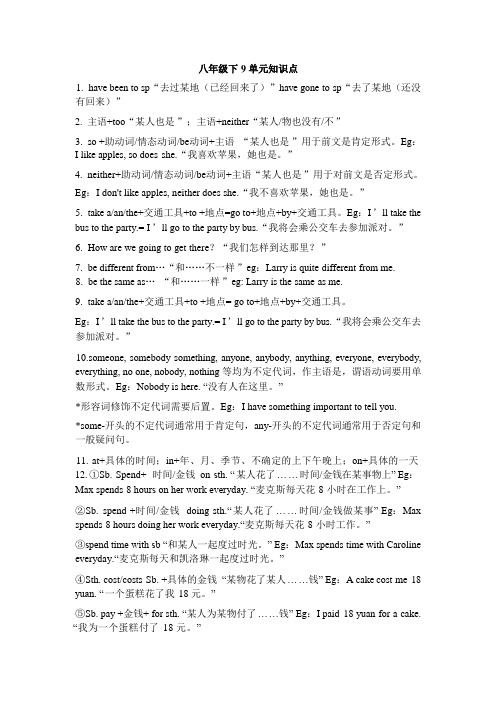
1. have been to sp“去过某地(已经回来了)”have gone to sp“去了某地(还没有回来)”2. 主语+too“某人也是”;主语+neither“某人/物也没有/不”3. so +助动词/情态动词/be动词+主语“某人也是”用于前文是肯定形式。
Eg:I like apples, so does she.“我喜欢苹果,她也是。
”4. neither+助动词/情态动词/be动词+主语“某人也是”用于对前文是否定形式。
Eg:I don't like apples, neither does she.“我不喜欢苹果,她也是。
”5. take a/an/the+交通工具+to +地点=go to+地点+by+交通工具。
Eg:I ’ll take the bus to the party.= I ’ll go to the party by bus.“我将会乘公交车去参加派对。
”6. How are we going to get there?“我们怎样到达那里?”7. be different from…“和……不一样”eg:Larry is quite different from me.8. be the same as… “和……一样”eg: Larry is the same as me.9. take a/an/the+交通工具+to +地点= go to+地点+by+交通工具。
Eg:I ’ll take the bus to the party.= I ’ll go to the party by bus.“我将会乘公交车去参加派对。
”10.someone, somebody something, anyone, anybody, anything, everyone, everybody, everything, no one, nobody, nothing 等均为不定代词,作主语是,谓语动词要用单数形式。
人教版八年级下册英语Unit9知识点学习资料

人教版八年级下册英语U n i t9知识点Unit9 Have you ever been to a museum?名词:camera 照相机;摄像机toilet 坐便器;厕所province 省份spring 春天fox 狐狸information 信息;资料invention 发明;发明物amusement 娱乐;游戏ride 供乘骑的游乐设施;短途旅程动词:encourage 鼓励collect 收集;采集形容词:unbelievable 难以置信的;不真实的rapid 迅速的;快速的unusual 特别的;不寻常的social 社会的peaceful 和平的;安宁的perfect 完美的;完全的safe 安全的;无危险的副词:simply 仅仅;只;不过mostly 主要的;通常数词:thousand 一千连词:whether 不管……(还是);或者……(或者);是否whenever 在任何……的时候;无论何时兼类词:progress v&n 进步;进展fear v&n害怕;惧怕Indian adj印度的 n印度人German adj德国的;德语的;德国人的 n德语;德国人Japanese adj日本的;日本人的;日语的 n日本人;日语短语:amusement park 游乐场tea art 茶艺tea set 茶具a couple of 两个;一对;几个thousands of 数以千计的;许许多多的all year round 全年on the one hand……on the other hand……一方面……另一方面……知识点:1、to one's amusement 令某人发笑的是to one's surprise 令某人吃惊的是to one's joy/happiness 令某人高兴的是To Tom's amusement, Lily and Jack are dancing and singing in the car. 令Tom发笑的是,Lily 和Jack在车里又唱又跳。
人教版英语八年级下册单元Unit 9 知识点+测试卷+思维导图
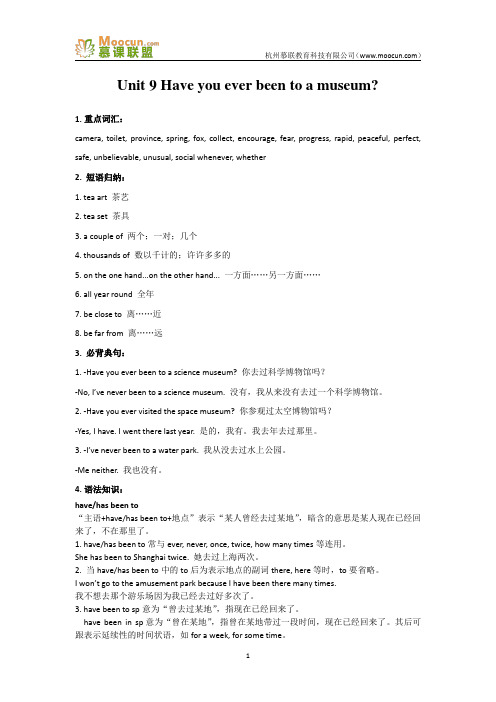
Unit 9 Have you ever been to a museum?1.重点词汇:camera, toilet, province, spring, fox, collect, encourage, fear, progress, rapid, peaceful, perfect, safe, unbelievable, unusual, social whenever, whether2. 短语归纳:1. tea art 茶艺2. tea set 茶具3. a couple of 两个;一对;几个4. thousands of 数以千计的;许许多多的5. on the one hand...on the other hand... 一方面……另一方面……6. all year round 全年7. be close to 离……近8. be far from 离……远3. 必背典句:1. -Have you ever been to a science museum? 你去过科学博物馆吗?-No, I’ve never been to a science museum. 没有,我从来没有去过一个科学博物馆。
2. -Have you ever visited the space museum? 你参观过太空博物馆吗?-Yes, I have. I went there last year. 是的,我有。
我去年去过那里。
3. -I’ve never been to a water park. 我从没去过水上公园。
-Me neither. 我也没有。
4.语法知识:have/has been to“主语+have/has been to+地点”表示“某人曾经去过某地”,暗含的意思是某人现在已经回来了,不在那里了。
1. have/has been to常与ever, never, once, twice, how many times等连用。
人教版初中八年级英语下册第九单元Unit 9 教案含教学反思

Section A 单词camera n.照相机;摄影机;摄像机unbelievable adj.难以置信的;不真实的progress v.&n.进步;进展rapid adj.迅速的;快速的unusual adj.特别的;不寻常的toilet n.坐便器;厕所encourage v.鼓励social adj.社会的peaceful adj.和平的;安宁的perfect adj.完美的;完全的itself pron.它自己collect v.收集;采集German adj.德国的;德语的;德国人的n.德语;德国人ride n.供乘骑的游乐设施;短途旅程province n.省份amusement n.娱乐;游戏somewhere adv.在某处;到某处invention n.发明;发明物invent v.发明;创造performance n.表演;演出theme n.主题短语amusement park游乐场lead to导致put up搭起think about考虑make tea沏茶tea art 茶艺tea set茶具equator n.赤道短语take a holiday度假three quarters四分之三at night在夜晚all year round全年be close to 靠近be far from远离……thousands of 数以千计的;许许多多的whether…or…不管……还是……on the one hand…on the other hand…一方面……另一方面……句型1.On the one hand,more than three quarters of the population are Chinese,so you can simply speak Putonghua a lot of the time. On the other hand,Singapore is an English-speaking country,so it’s also a good place to practice your English! 一方面,超过四分之三的人口是华裔,因此很多时候你可以只说普通话。
最全面人教版八年级下册英语第九单元知识点归纳总结
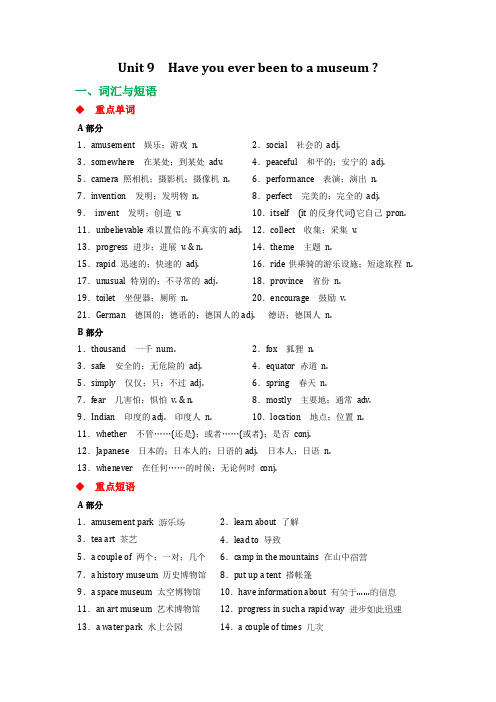
Unit 9 Have you ever been to a museum ?一、词汇与短语◆重点单词A部分1.amusement 娱乐;游戏n.2.social 社会的adj. 3.somewhere 在某处;到某处adv.4.peaceful 和平的;安宁的adj. 5.camera 照相机;摄影机;摄像机n.6.performance 表演;演出n. 7.invention 发明;发明物n.8.perfect 完美的;完全的adj. 9.invent 发明;创造v.10.itself (it的反身代词)它自己pron. 11.unbelievable难以置信的;不真实的adj.12.collect 收集;采集v. 13.progress 进步;进展v. & n.14.theme 主题n.15.rapid 迅速的;快速的adj.16.ride供乘骑的游乐设施;短途旅程n. 17.unusual 特别的;不寻常的adj.18.province 省份n.19.toilet 坐便器;厕所n.20.encourage 鼓励v.21.German 德国的;德语的;德国人的adj. 德语;德国人n.B部分1.thousand 一千num.2.fox 狐狸n.3.safe 安全的;无危险的adj.4.equator 赤道n.5.simply 仅仅;只;不过adj.6.spring 春天n.7.fear 几害怕;惧怕v. & n.8.mostly 主要地;通常adv. 9.Indian 印度的adj. 印度人n.10.location 地点;位置n. 11.whether 不管……(还是);或者……(或者);是否conj.12.Japanese 日本的;日本人的;日语的adj. 日本人;日语n.13.whenever 在任何……的时候;无论何时conj.◆重点短语A部分1.amusement park 游乐场2.learn about 了解3.tea art 茶艺4.lead to 导致5.a couple of 两个;一对;几个6.camp in the mountains 在山中宿营7.a history museum 历史博物馆8.put up a tent 搭帐篷9.a space museum 太空博物馆10.have information about 有关于……的信息11.an art museum 艺术博物馆12.progress in such a rapid way 进步如此迅速13.a water park 水上公园14.a couple of times 几次15.in the future 在将来16.encourage sb. to do sth. 鼓励某人做某事17.have a great time 过得愉快18.somewhere different 某个不同的地方19.a film museum 电影博物馆20.the tea art performance 茶艺表演21.take a ride on the boat for several days 乘船旅行几天22.the history and development of…… ……的历史和发展B部分1.all year round 全年2.thousands of 数以千计的;许许多多的3.a lot of the time 大部分时间4.in the dark 在黑暗中5.outside of China 在中国以外6.an English-speaking country 一个说英语的国家7.during the daytime 在白天8.have problems doing sth. 做某事有困难9.be close to 靠近;接近10.the best time to do sth. 做某事的最好时间11.choose to do sth. 选择做某事12.be far from 远离13.three quarters of the population 人口的四分之三14.on the one hand……on the other hand……一方面……另一方面……◆重点句子A部分1.—Have you ever been to the space museum? —你曾去过太空博物馆吗?—Yes, I have. How about you? —是的,我去过。
人教版八年级英语下册Unit9知识点归纳

人教版八年级英语下册Unit9知识点归纳Unit 9: Have you ever been to a museum。
Knowledge Points Summary1.Key Phrases:At night: during the nightIn a more natural environment: in a setting that is more naturalAll year round: XXXXXX: XXXIn the dark: in a place without lightIn the past: in us timesHave been to: visited a placeScience museum: a museum focused on scienceHistory museum: a museum focused on historyXXX park: XXXGo XXX: visit a place that is not familiarGo skating: ice skateTake the subway: XXX systemA great way to XXXAll the old movie cameras: all the antique movie cameras Learn about something: gain knowledge about a topic On the weekend: during the weekendXXX: sleep in a tent in the mountainsPut up a tent: assemble a XXXIn such a rapid way: in a very fast mannerDifferent kinds of: us types ofDevelopment of toilets: the progress of XXXSocial groups: XXXXXX XXX: XXXMake a perfect cup of tea with beautiful tea sets: XXXA nice place to XXXXXX of: many。
人教版英语八年级下unit9语法全解
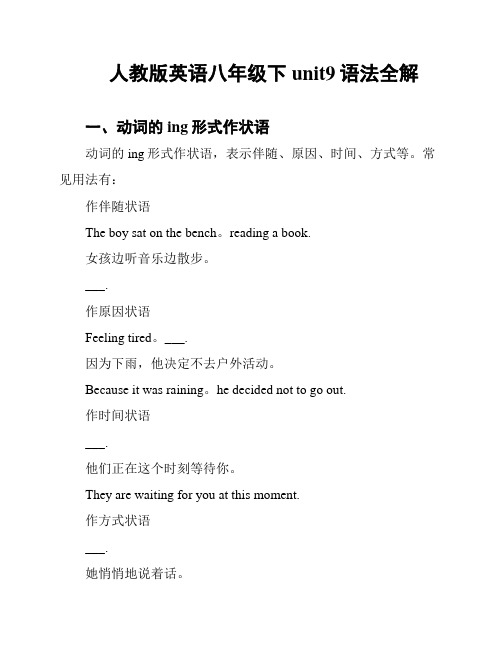
人教版英语八年级下unit9语法全解一、动词的ing形式作状语动词的ing形式作状语,表示伴随、原因、时间、方式等。
常见用法有:作伴随状语The boy sat on the bench。
reading a book.女孩边听音乐边散步。
___.作原因状语Feeling tired。
___.因为下雨,他决定不去户外活动。
Because it was raining。
he decided not to go out.作时间状语___.他们正在这个时刻等待你。
They are waiting for you at this moment.作方式状语___.她悄悄地说着话。
___.二、比较级的构成与用法比较级主要用于两个人或事物之间的比较,常加er后缀构成。
常见用法有:表示两者之间的比较Tom is taller than Jack.这个箱子比那个箱子重。
This box is heavier than that one.表示一者和多者之间的比较Tom is the ___.她是我们班最聪明的学生之一。
She is one of the smartest students in our class.表示程度或数量的增加The more you practice。
the better you will be.我们的队伍比去年多了30人。
Our team has 30 more members than last year.三、一般过去时与过去进行时的用法一般过去时用于表示在过去某个时间发生的动作或存在的状态。
常见用法有:表示过去的事件___.我们昨天去了海滩。
We went to the ___.表示过去的惯或状态She often played the piano when she was young.他小时候常常生病。
He often got sick when he was a child.过去进行时表示过去某一时刻正在进行的动作。
- 1、下载文档前请自行甄别文档内容的完整性,平台不提供额外的编辑、内容补充、找答案等附加服务。
- 2、"仅部分预览"的文档,不可在线预览部分如存在完整性等问题,可反馈申请退款(可完整预览的文档不适用该条件!)。
- 3、如文档侵犯您的权益,请联系客服反馈,我们会尽快为您处理(人工客服工作时间:9:00-18:30)。
明天要么你去那里,要么我去那里
• adv. 也不(置于句首倒装) eg. —I don’t like this dress.
我不喜欢这件连衣裙。
—Neither / Nor do I.
我也不喜欢。
• have a great time 玩的愉快 have fun doing sth. enjoy oneself • character n. 人物 角色 characteristic n. 特点 特质
Thank you
对…挑剔的
• end up 结束 以…结束 end up + in/with 以…告终/结束
eg. If you go on like this you will end 后面的宾语是主语的结果 up in prison. 你再这样继续下去会进监狱的。 The meeting end up.with a song.
印度人 印度 亚洲人 亚洲 美国人 美国 加拿大人 加拿大 日本人 日本 中国人 中国
• dark adj. 黑色的 黑暗的 邪恶的 n. 黑暗 无知 黄昏 in the dark eg.She could see nothing in the dark. The public was kept in the dark.
adj. (两者)都不 置于单数名词前 eg.Neither company could suceed on its own.
没有一个公司可以依靠而自己成功
pron. (两者)都不 eg.He answered neither of the letters.
他两封信都没回。 neither of either of both of all of none of
Present perfect
• Ⅰ.用来表示已经发生或完成的动作或
状态对现在造成的影响或结果
eg.They have left.
他们已经走了(他们现在不在)
I have had my lunch.
我吃过午饭了(现在不饿)
Ⅱ.也表示持续到现在的动作或状态
eg. They have learnt English since 2001.
• Temperature n.温度 Take one’s temperature
给某人量体温
• Whenever =no matter when无论何时 • Season n.季节 In spring ,in summer, in autumn, in winter
• • • • • • • • •
她要求我立刻去。
•population n.人口
谓语动词的单复数视情况而定
Ⅰ.
The world\'s population is increasing faster and faster.
全世界的人口增长得越来越快。
主语用时,谓语动词常 用第三人称单数形式
Ⅱ.
About seventy percent of the population in China are farmers.
Unit 9
Have you ever been to an amusement park?
vocabulary & phrase
• amusement : =entertainment=recreation
n.娱乐 消遣
amuse
v.使…欢乐 给…提供消遣
amusing
adj.有趣的 好玩的
• neither
sth. require doing
用v-ing表示被动
sth. require to be done eg. The machine requires requiring.
机器该修了。
require that + 从句 require that sb. + (should) + do
eg.She required that I (should) go at once .
后面的宾语是 主语的一部分
• end up + doing eg. They end up getting married.
他们最后结婚了。
end vi. 结束 n. 终点 结束 in the end at the end of
discover v.发觉 发现 requirement n.要求 必要条件 v. 要求 require sb. to do sth. require sth. of sb. eg.He requires his birthday gift of his mother.
at dark at dusk 在黄昏 at dawn 在黎明 from dawn to dark 从黎明到黄昏
• wake v.醒来,唤醒 wake up awake adj.醒着的(作表语) • natural adj.自然的,自然界的 n. nature自然界,本性 in nature =by nature
• seen v.
see→saw→seen see sb. do/doing sth.
look 看的过程 不及物 see 看的结果 及物
• attraction n. 有吸引力的人或事物 attract v. 吸引 attractive adj. be attractive to
• board n. 甲板,董事会 on board 在船上 broad adj. 宽阔的 广泛的 宽的 • espacially adv. 特别 尤其 particularly = in particular be particular about
谓语动词用单数
谓语动词用复数
谓语单复都可
•
conj 谓语动词 neither…nor… “就近原则” eg. Neither he nor I know the answer.
我和他都不知道答案。
either…or…
或者…或者… 不是…就是…
eg. Either you or I am going there tomorrow. 谓语动词
动作对现在造成的影响或结果
常与时间副词already(已经)
yet(还、已经) just(刚刚、仅仅) ever(曾经) never(从不) before(以前)等连用。
• 二.持续性用法: 肯定句,疑问句中谓语动词必须是延 续性动词 表示过去已经开始,持续到现在的动 作或状态。 常与“for +一段时间或“since+过 去的时间点或从句以及so far(到目前 为止)等时间状语连用。
在船上 On board 空中服务员 Flight attendant 四分之三 Three quarters 醒来,睡醒 Wake up 一年到头 all year round
Grammer
The topic of this unit : Have you ever been to an amusement park? 现在完成时 present perfect
从2001年开始学英语(现在还在学)
structure 构成
• (一)肯定式
主语+助动词have /has +过去分词 +其它
• (二)否定式
主语+助动词have /has+not+过去分词 +其它
• (三)一般疑问式
助动词Have /Has +主语+过去分词 +其它 ?
现在完成时的用法: 一.表示过去发生或已经完成的某一
中国大约有百分之七十的人口是农民
当主语是表示人口的百 分之几、几分之几时, 谓语动词用复数式
• fear n.害怕 担心 忧虑 v.害怕 担心 fear sb./sth. worry about sb./sth.
• Indian → India Asian → Asia American → nese → Japan Chinese → China
